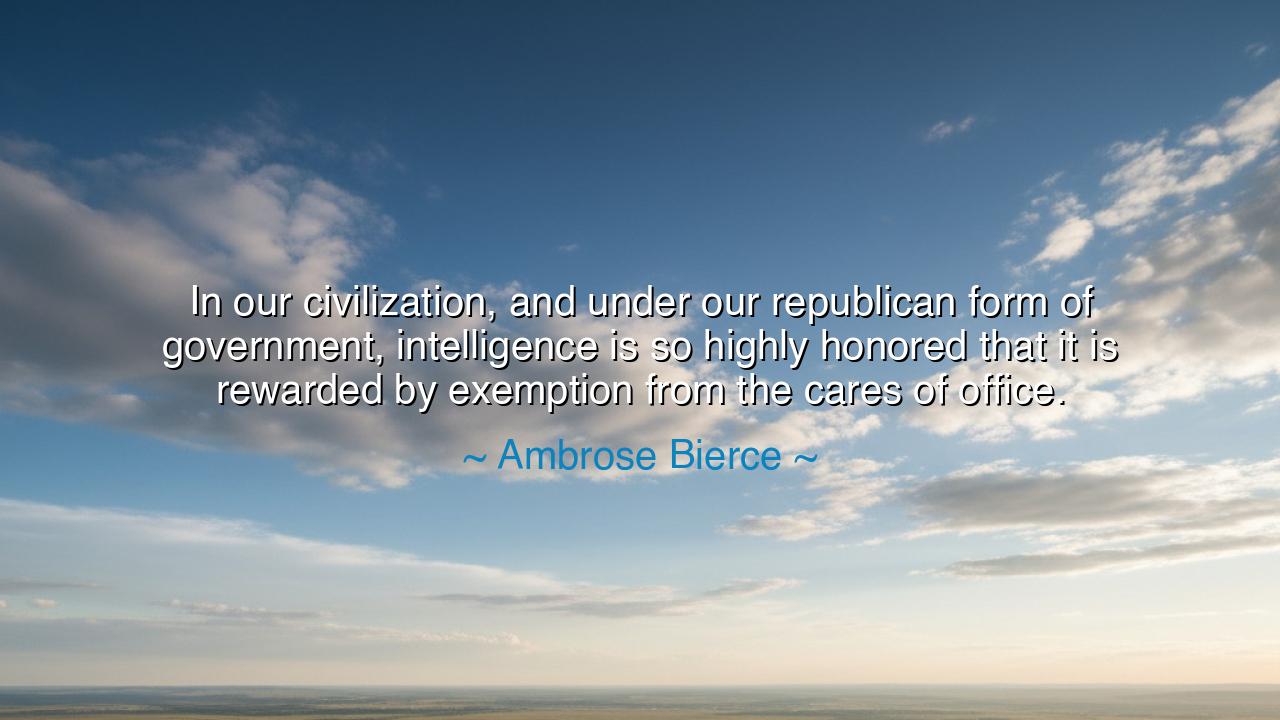
In our civilization, and under our republican form of government
In our civilization, and under our republican form of government, intelligence is so highly honored that it is rewarded by exemption from the cares of office.






"In our civilization, and under our republican form of government, intelligence is so highly honored that it is rewarded by exemption from the cares of office." Thus wrote Ambrose Bierce, the darkly brilliant satirist of the American spirit, whose pen carved truth with the sharpness of irony. His words, at once bitter and profound, expose a paradox that has haunted every free society: that intelligence, though praised in speech, is rarely entrusted with power. Bierce’s voice, steeped in wit and sorrow, reminds us that in a republic built upon reason, it is often the unreasonable who rule, while the wise watch from the shadows.
Bierce lived in the turbulent heart of the 19th century — a time of war, corruption, and industrial upheaval. He had seen the promise of the American Republic tested by greed, vanity, and ignorance. With the precision of a surgeon and the cruelty of a prophet, he laid bare the hypocrisies of his age. In this quote, drawn from his sardonic masterpiece The Devil’s Dictionary, Bierce turns a mirror upon society’s self-deception. We claim, he says, to honor intelligence, to admire wisdom and learning — yet when it comes to government, we often exile the wise, preferring instead the loud, the ambitious, and the cunning. The clever man avoids office not because he is unworthy, but because he is too intelligent to desire the burdens and compromises that come with it.
In this irony lies a warning. Republican government, built upon the participation of the people, depends upon the virtue and intellect of those who serve. But when a society praises intelligence while rewarding mediocrity, it endangers its own foundation. The truly intelligent, seeing the corruption and futility of politics, withdraw in disillusionment, leaving the arena to those driven by vanity rather than vision. Thus, intelligence becomes not the light that guides the state, but the candle hidden under a basket — and the republic, deprived of its wisest voices, drifts toward decay.
History offers many mirrors to this truth. Consider the fate of Socrates, the wisest of the ancient Greeks. He sought no office, desired no crown, yet he dared to teach truth in a city intoxicated by its own democracy. Athens, that glorious cradle of reason, rewarded his wisdom not with power but with poison. The people, jealous of the philosopher’s insight and offended by his questions, condemned him to death. In the centuries since, how many wise men and women have met the same fate — not in body, but in spirit? How many have turned away from service because they knew that in the realm of politics, truth is often punished and ignorance exalted?
Bierce, ever the cynic, might say this is the natural order of things — that intelligence and power are eternal adversaries. The one seeks understanding; the other, control. The wise man desires knowledge for its own sake; the politician desires influence. And so, the intelligent are “rewarded” with freedom from the cares of office, spared the compromises that corrupt ideals and the flattery that poisons the tongue. Yet what begins as wisdom — the refusal to stoop to corruption — may end in tragedy, for when the wise refuse to lead, the foolish inherit the throne.
But we, who look back upon Bierce’s words from a later age, may read them not only as satire, but as a call to courage. For though intelligence often recoils from the filth of politics, it is precisely there that it is most needed. The republic, to endure, must persuade its best minds to serve, even when service wounds the soul. The man of intellect must not retreat entirely into study, nor the woman of wisdom into silence. It is not enough to mock the corrupt from afar; the wise must descend into the fray, carrying the lamp of reason through the fog of ignorance.
The lesson is clear and enduring: to honor intelligence is not to remove it from responsibility, but to entrust it with leadership. Let the people not reward cunning and ambition with office, but wisdom and integrity. Let the intelligent learn that withdrawal is no virtue if it leaves the field to the corrupt. A republic, like a mind, thrives only when thought and action work as one. The greatest danger to liberty is not the tyrant who rules, but the wise who will not stand against him.
So remember the grim wisdom of Ambrose Bierce: that the praise of intelligence without the practice of it is hypocrisy. A nation that honors wisdom in word but not in deed condemns itself to folly. Therefore, let each citizen strive to unite intellect with duty — to think deeply, but also to act bravely. For only when the intelligent take up the burdens of office, and the powerful bow to the authority of truth, will the republic stand firm against the storms of time.






AAdministratorAdministrator
Welcome, honored guests. Please leave a comment, we will respond soon